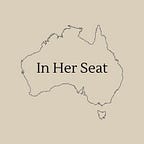Wendy Askew: Support matters
“I have received extensive support and encouragement from many of the current serving ministers”
Almost 100 years ago, Edith Cowan became the first woman elected to an Australian parliament, in March 1921.
In Her Seat is asking as many currently serving female politicians as we can how they view gender equality, politics and their impact.
This is a non-partisan project that is soliciting contributions from women in all parties, or none at all, in every parliament.
Wendy Askew is a Senator from Tasmania.
Wendy came to the parliament with a personal and professional experience of politics. Her father and brother were politicians and she had worked in a variety of political offices.
Wendy also worked in banking and the disability sector, helping her see the breadth of her community.
This sense of duty to the community lives on with her children, one who is a teacher and the other a police officer.
In parliament, Wendy is focused on the flux between community and opportunity, bringing her experience to the floor.
What does gender equality mean to you?
I came to the Senate following in the footsteps of three trailblazing Tasmanian women — Dame Enid Lyons, the first conservative woman from Tasmania to enter federal parliament and the first woman appointed to cabinet; Shirley Walters, who was Tasmania’s first woman elected as a senator; and Jocelyn Newman, who reshaped the way we delivered social security entitlements.
To me they each played an important part in shaping our nation, not because they were women, but because they chose to enter public life and share their skills and life experience in the parliament. The contribution they made should be what is acknowledged not that they were the first woman to achieve it. True equality will be achieved when despite someone’s gender, not because of it, their achievements are recognised.
Which female politicians have inspired or encouraged you?
Although not a politician herself, my mother Elaine Bushby was always politically engaged.
She was a proud and active supporter of my father Max Bushby OBE who was a member of the House of Assembly in Tasmania from 1961 to 1986 and Speaker for four years. She also led by example in relation to political activism through her contribution to the National Council of Women in the areas of policies affecting women.
Outside my family I was influenced early by the late Sue Napier, former member of the House of Assembly, deputy premier and opposition leader in Tasmania.
I have also received extensive support and encouragement from many of the current serving ministers, particularly Linda Reynolds, Marise Payne and Jane Hume. Ministers Reynolds and Hume accompanied me as I was sworn in as a Senator in April 2019.
What inspired you to serve your community?
I have had a lifetime of community service, with my parents setting a strong example in this regard.
I have served on several charitable boards and have been a long-standing Rotarian, including serving as president of the Rotary Club of Central Launceston, before starting my political career.
Being able to assist those in need, and to take part in the development and implementation of policy was why I became actively involved, and then worked in several political offices.
The opportunity to serve was first considered at the suggestion of my brother David Bushby, himself a former Tasmanian Senator.
Both of us were greatly influenced by a challenge from our father, shortly before his death, to get actively involved with politics.
What are the most important contributions you are making in Parliament?
I am a member of several parliamentary committees, and I hold two positions within Community Affairs as Chair of the Community Affairs Legislation Committee and Deputy Chair of the Community Affairs References Committee. The Community Affairs committees cover the important Health and Social Services portfolios, including Services Australia, which oversee vital legislation within this country’s social fabric.
My previous work in the banking, financial, and not-for-profit sectors, and service on charitable boards gave me valuable experience to help in my Senate deliberations and on these Senate Standing committees.
What is next for gender equality in politics?
Too often women undervalue their own contribution and ability, and as peers we need to encourage and support each other to maximise the opportunities before us.
What is often not properly acknowledged, or celebrated, is the large number of capable women elected to all levels of government — local, state and federal.
We all have diverse experiences to contribute to government in the form of age, gender, religious beliefs and social and work backgrounds.
I do not believe quotas are the answer to gender equity within the parliament.
Instead we need to provide an environment that allows flexibility for anyone considering a political career that can adapt to suit their personal and family requirements.
Significant cultural change in this regard has been seen over the past decade, and it is reflected across the country in the greater diversity in our state and federal parliaments.
In Her Seat interviews can be accessed here
